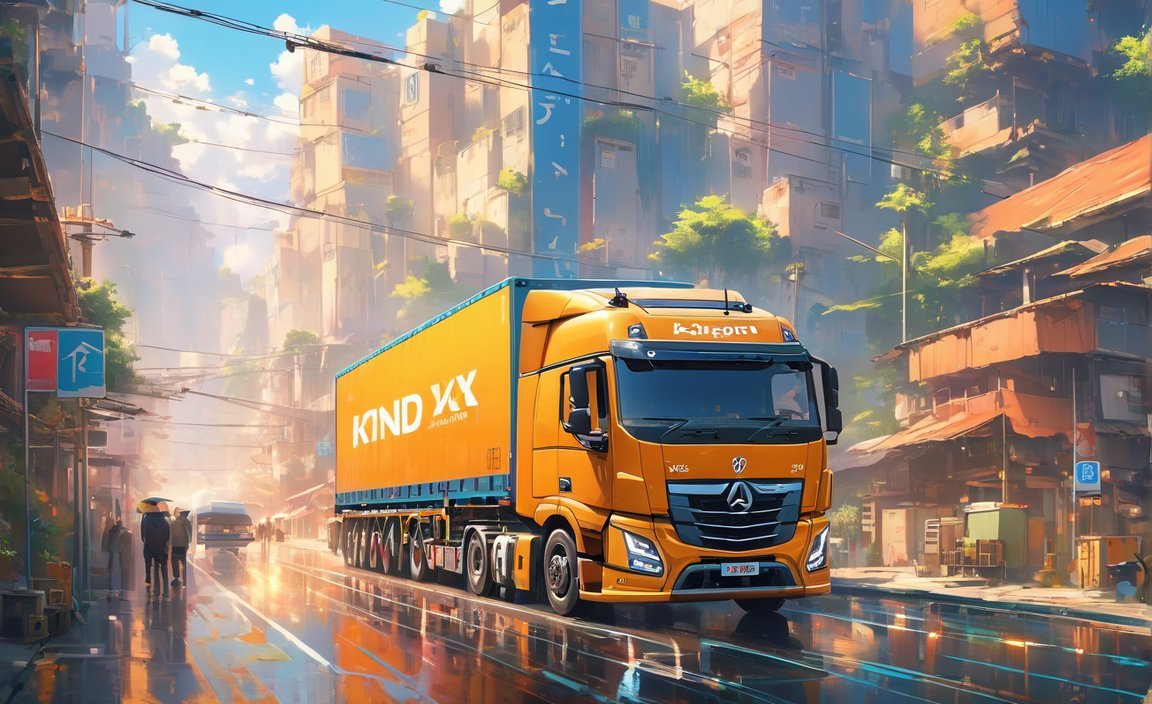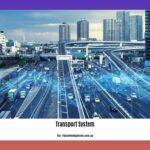In today’s globalized and interconnected world, road transport plays a pivotal role in driving economic growth, enhancing connectivity, and promoting sustainability. With its undeniable importance, understanding the ten crucial reasons why road transport is essential becomes imperative. From creating jobs and fostering trade to reducing carbon emissions and improving safety, road transport is the lifeline that ensures seamless access and mobility for communities worldwide.

Key Takeaways:
- Flexibility: Road transport offers numerous routes and destinations, allowing for flexibility in service.
- Low maintenance cost: Compared to other modes of transport, road transport has lower maintenance costs.
- Directness and door-to-door communication: Road transport enables direct communication and easy access to customers.
- Speed and cheapness over short distances: Road transport is fast and cost-effective for short-distance travel.
- Continuous movement: Road transport facilitates efficient transportation by ensuring continuous movement.
- Transporting low-volume products quickly: Road transport is ideal for transporting low-volume products over short and medium distances.
- Bypassing waiting times at ports: By using road transport, products can be delivered directly to customers at the warehouse, bypassing waiting times at ports.
- Link to health, economic performance, and social fabric of cities: Road transport is connected to the well-being and economic growth of cities.
- Cost-effective and personalized service: Road transport offers tailored haulage, reduced risks, and fast delivery.
- Essential infrastructure and connectivity: Roadways play a vital role in connecting different areas and providing essential transportation infrastructure.
10 Importance of Road Transport
Road transport plays a vital role in driving economic growth, enhancing connectivity, and promoting sustainability. Let’s explore the ten crucial reasons why road transport is indispensable in shaping our world.
1. Flexibility and Accessibility
Road transport offers a remarkable level of flexibility, enabling numerous routes and destinations. Unlike other modes of transport, roadways provide direct access to even the most remote locations. This accessibility plays a significant role in connecting communities, facilitating trade, and fostering economic development.
2. Efficient and Cost-Effective
With low maintenance costs compared to other modes of transport, roadways provide a cost-effective solution for moving goods and people. The ability to transport low-volume products over short and medium distances quickly and flexibly is a significant advantage. This efficiency saves time, reduces waiting times at ports, and ensures faster delivery directly to customers.
3. Speed and Directness
Road transport offers great speed and directness, making it an ideal choice for short-distance travel and delivery. By bypassing waiting times at ports and warehouses, roadways enable efficient and swift transportation of goods and essential supplies. This level of speed and directness contributes to the smooth functioning of logistics and supply chain networks.
4. Continuous Movement
One of the key advantages of road transport is its ability to provide continuous movement. Unlike other modes of transport that are subject to schedules or timetables, roadways allow for uninterrupted flow. This ensures a seamless transportation experience and enables industries to keep up with production demands and distribution needs.
5. Essential Infrastructure
Roadways play a crucial role in providing essential infrastructure for transportation. They connect different areas, cities, and regions, enabling people and automotive vehicles to reach their destinations without hindrance. This seamless connectivity supports economic activities, facilitates cultural exchanges, and promotes tourism.
6. Personalized Service and Tailored Haulage
Road transport offers personalized service and tailored haulage options, catering to the unique needs of industries and businesses. Whether it’s transporting perishable goods, oversized cargo, or fragile items, roadways provide the flexibility to accommodate different requirements. This level of customization enhances customer satisfaction and contributes to the overall efficiency of supply chains.
7. Reduced Risk
Road transport allows for greater control and reduced risk compared to other modes of transport. With direct involvement in driving and managing the transportation process, road users can actively monitor and address any issues that arise during transportation. This hands-on approach minimizes the chances of delays, damages, or disruptions, ensuring a smoother and more reliable delivery process.
8. Linking Health and Economy
Road transport is inherently linked to the health, economic performance, and social fabric of cities. Well-designed road networks reduce congestion, enhance traffic flow, and improve air quality. This has a significant impact on the overall well-being of communities, attracting investment, creating job opportunities, and stimulating economic growth.
9. Sustainable Practices
While road transport has its environmental challenges, it also holds great potential for sustainability. As technology advances, the introduction of electric and hybrid vehicles reduces carbon emissions and mitigates climate impact. Additionally, improved traffic management systems, alternative fuels, and smarter logistics contribute to creating a more sustainable and eco-friendly road transport system.
10. Versatile and Evolving
Road transport is a versatile mode of transportation that can adapt to changing needs and advancements in technology. It has the flexibility to accommodate different vehicle types, including cars, trucks, buses, and bicycles. Additionally, roadways can be upgraded, expanded, and integrated with intelligent transportation systems, further enhancing their efficiency and safety.
In conclusion, road transport’s flexibility, low maintenance cost, directness, speed, continuous movement, and ability to transport low-volume products make it an indispensable component of our global transportation system. Its role in connecting communities, promoting economic growth, and supporting sustainable practices cannot be overstated. By continually evolving and embracing technological advancements, road transport will continue to drive economic growth, enhance connectivity, and contribute to a sustainable future.
Rivers play a crucial role in our lives, providing numerous benefits that are often overlooked. Discover the 10 importance of rivers to man in geography, and how they shape the world around us. Click here to dive deep into the fascinating relationship between rivers and geography.
In Nigeria, rivers hold a special significance, serving as lifelines for communities and ecosystems alike. Uncover the 10 importance of rivers to man in Nigeria, and explore the rich cultural and environmental heritage they embody. Click here to embark on a virtual journey along the enchanting rivers of Nigeria.
Transportation is an integral part of our modern society, facilitating the movement of people and goods across vast distances. Discover the 10 importance of transportation, and how it impacts various aspects of our lives. Click here to explore the vital role transportation plays in shaping our world.
In the realm of marketing, transportation holds immense significance as it enables the seamless distribution of products and services. Uncover the 10 importance of transportation in marketing, and learn how it influences consumer behavior and business strategies. Click here to delve into the fascinating interplay between transportation and marketing.
Reducing Carbon Emissions for a Sustainable Future
The transportation sector is a significant contributor to global carbon emissions, with projections indicating a 20% increase by 2050[^1^]. This alarming figure underscores the urgent need for sustainable solutions to reduce carbon emissions and mitigate climate change impacts. As we strive for a sustainable future, focusing on reducing carbon emissions in road transport plays a crucial role in achieving our global climate targets and ensuring a sustainable future[^3^].
Road transport is responsible for a substantial portion of CO2 emissions in both developed countries and globally[^2^]. By implementing measures to reduce these emissions, we can make a substantial impact on the fight against climate change.
A low-carbon pandemic recovery could result in significant emissions reduction by 2030, particularly in sectors such as shipping, aviation, and lifestyle changes[^4^]. By prioritizing sustainable practices in road transport, we can contribute to this reduction and create a more sustainable future.
Sustainable transport is a key component of the shift towards green energy[^5^]. By adopting sustainable fuels and integrating hybrid electric vehicles into road transport systems, we can significantly reduce carbon and pollutant emissions, leading to a more sustainable future[^6^].
Efforts are being made globally to reduce CO2 emissions from road vehicles. Governments, organizations, and researchers are developing frameworks and policies aimed at minimizing the environmental impact of road transportation[^8^][^9^]. This demonstrates the increasing recognition of the importance of reducing carbon emissions for a sustainable future.
By implementing measures to reduce CO2 emissions from road transport, we can achieve greater environmental sustainability and work towards carbon neutrality[^10^]. This is crucial in creating a sustainable future and ensuring the well-being of future generations.
Road transport plays a vital role in our daily lives and the global economy. However, to achieve a sustainable future, we must prioritize reducing carbon emissions in road transport systems. By implementing sustainable practices, embracing technological advancements, and fostering collaboration among governments and industries, we can create a road transport system that is environmentally friendly and contributes to a sustainable future.
Key Takeaways:
- The transportation sector’s carbon emissions are projected to increase by 20% by 2050[^1^].
- CO2 emissions from the transport sector account for about 30% in developed countries and about 23% globally[^2^].
- Sustainable transport is crucial for achieving global climate targets[^3^].
- A low-carbon pandemic recovery could reduce emissions in 2030 by 25%[^4^].
- Sustainable transport is key to the shift towards green energy[^5^].
- Sustainable fuels and hybrid electric vehicles can reduce carbon and pollutant emissions[^6^].
- Efforts are being made to reduce CO2 emissions from road transport globally[^8^][^9^].
- Urgent action is needed to achieve carbon neutrality[^10^].
- Various measures are being implemented to reduce CO2 emissions from road vehicles[^10^][^11^].
- Policies supporting alternatives to fossil fuel-burning vehicles are necessary for reducing transportation’s climate impact[^11^].
Sources:
[^1^] World Economic Forum
[^2^] UNECE
Ensuring Safety and Reducing Road Accidents
Road transport plays a vital role in fostering economic growth, enhancing connectivity, reducing carbon emissions, improving safety, and promoting accessibility for communities worldwide. One key aspect of road transport that cannot be overlooked is ensuring safety and reducing road accidents. By prioritizing safety measures and implementing effective strategies, we can create a safer environment for all road users.
How can we ensure safety and reduce road accidents?
1. Investing in Infrastructure:
Improving road infrastructure is crucial for ensuring safety. Well-designed roads, proper signage, and effective traffic management systems can help prevent accidents and guide drivers in a clear and safe manner.
2. Promoting Safe Behaviors:
Educating drivers and promoting responsible behavior on the roads are essential for accident prevention. Enforcing traffic laws, strict vehicle inspections, and raising awareness about the dangers of reckless driving can make a significant difference.
3. Enhancing Vehicle Safety:
Advancements in vehicle safety technology can greatly contribute to reducing road accidents. Implementing features such as anti-lock braking systems (ABS), electronic stability control (ESC), and adaptive cruise control can help prevent collisions and mitigate the severity of accidents.
4. Ensuring Effective Law Enforcement:
Rigorous law enforcement, including regular police patrols, sobriety checkpoints, and speed control measures, can deter reckless driving and ensure that traffic laws are upheld. This proactive approach can significantly reduce the number of accidents on our roads.
5. Implementing Intelligent Transportation Systems (ITS):
Integrating advanced technologies into road transport systems can enhance safety. Intelligent Transportation Systems (ITS) can provide real-time information on traffic congestion, weather conditions, and road hazards, enabling drivers to make informed decisions and avoid potential accidents.
Key Takeaways:
– Investing in infrastructure plays a crucial role in ensuring road safety.
– Promoting safe behaviors and enforcing traffic laws are essential for accident prevention.
– Vehicle safety enhancements can help reduce the impact of accidents.
– Effective law enforcement measures can deter reckless driving and uphold traffic laws.
– Implementing intelligent transportation systems can provide real-time information to enhance driver safety.
Sources:
1. World Health Organization – Seize the moment to tackle road crash deaths and build a safe…
2. BMC Public Health – Effects of interventions for preventing road traffic crashes: an…
Supporting Trade and Logistics for Global Connectivity
Key Takeaways:
– Road transport plays a crucial role in supporting trade and logistics for global connectivity.
– It offers flexibility, accessibility, and cost-effectiveness, connecting even remote locations and facilitating economic development.
– Road transport provides speed, directness, and continuous movement, ensuring efficient transportation of goods and supplies.
– Well-designed road networks improve traffic flow, reduce congestion, and enhance air quality, positively impacting the economy and social fabric of cities.
– Technological advancements in road transport, such as electric and hybrid vehicles, contribute to sustainability by reducing carbon emissions.
– Coordinated interaction between different modes of transport, including road freight, is crucial for maintaining supply chains.
Road transport is a fundamental driver of economic growth, connectivity, and sustainability, supporting trade and logistics for global connectivity. It offers a multitude of benefits that contribute to the efficient movement of goods and people across countries and regions.
One of the key advantages of road transport is its flexibility and accessibility. It enables connectivity even in remote locations, ensuring that no area is left behind in terms of trade and economic development. Whether it’s delivering goods to a small village or transporting products from a manufacturing facility to a port, road transport provides the necessary connectivity to support trade flows.
In addition to accessibility, road transport is also cost-effective and efficient, particularly for short and medium distances. The low maintenance costs and the ability to transport goods quickly and flexibly make road transport an attractive option for businesses. It allows industries to keep up with production demands and distribution needs, providing continuous movement that ensures smooth supply chains.
Furthermore, roadways serve as essential infrastructure, connecting areas, cities, and regions, and supporting economic activities and tourism. Well-designed road networks improve traffic flow, reduce congestion, and enhance air quality. This not only benefits the economy but also positively impacts the health and social fabric of cities.
Technology continues to play a vital role in enhancing road transport’s contribution to trade and connectivity. The development of electric and hybrid vehicles, for example, improves sustainability by reducing carbon emissions. This is crucial in the global effort to combat climate change and achieve environmental sustainability. It demonstrates the adaptability and versatility of road transport in accommodating changing needs and advancements in technology.
Moreover, the coordination and interaction between different modes of transport, including road freight, are essential for maintaining supply chains. In today’s interconnected world, goods often need to travel through various modes of transport to reach their destination. Road transport serves as a vital link in these supply chains, ensuring the smooth movement of goods from producers to consumers.
In conclusion, road transport is a key enabler of trade and logistics for global connectivity. Its flexibility, accessibility, cost-effectiveness, and efficiency make it an indispensable element in supporting economic growth, enhancing connectivity, and promoting sustainability. By investing in road infrastructure and embracing technological advancements, we can further harness the potential of road transport to drive economic development and facilitate seamless global trade.
Sources:
– World Bank Group – Connectivity, Logistics & Trade Facilitation
– UNECE – Improving Connectivity and Sustainability for Transport, Transit

FAQ
Q1: What is the role of road transport in fostering economic growth?
A1: Road transport plays a crucial role in fostering economic growth by providing flexibility, speed, directness, and continuous movement for the transportation of goods and services. It allows for the efficient delivery of low-volume products over short and medium distances, bypassing waiting times at ports and enabling direct delivery to customers.
Q2: How does road transport enhance connectivity?
A2: Road transport enhances connectivity by providing essential infrastructure that connects different areas and allows people and automotive to reach their destinations without hindrance. It offers personalized service, tailored haulage, and door-to-door communication, making it easier to reach customers. Roadways serve as vital links in transportation networks, supporting trade facilitation and promoting connectivity at the local and international levels.
Q3: What are the benefits of road transport in reducing carbon emissions?
A3: Road transport plays an important role in reducing carbon emissions by supporting the shift towards sustainable and green energy. Efforts such as the use of sustainable fuels and hybrid electric vehicles can help in reducing carbon and pollutant emissions. Additionally, sustainable transport practices and the adoption of alternative modes of transportation contribute to the global climate targets and the achievement of carbon neutrality.
Q4: How does road transport contribute to improving safety?
A4: Road transport contributes to improving safety by addressing road traffic crashes through various interventions. These include the enforcement of laws, structural improvements, public awareness, legislation, driver education, and improvement of vehicle design. Enhancing vehicle safety design and addressing the human factor in ensuring safety are crucial aspects of road transport safety measures.
Q5: How does road transport promote accessibility for communities?
A5: Road transport promotes accessibility for communities by providing cost-effective and fast delivery of goods and services. It is linked to the health and economic performance of cities, allowing for personalized service and reduced risk. Roadways serve as essential infrastructure that connects communities to essential services such as jobs, education, and healthcare, thereby increasing accessibility for all.















